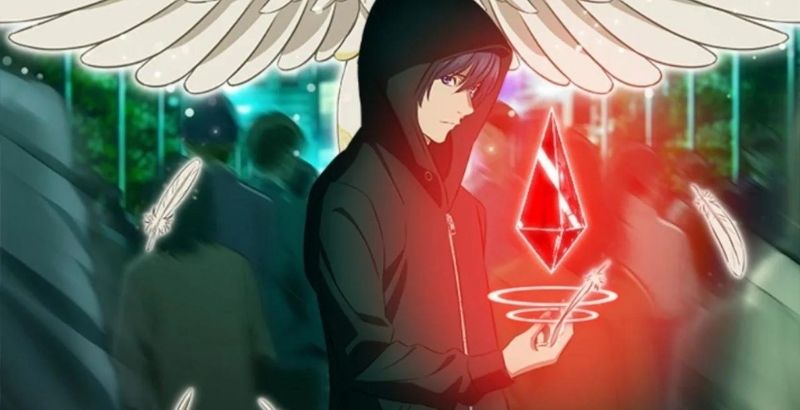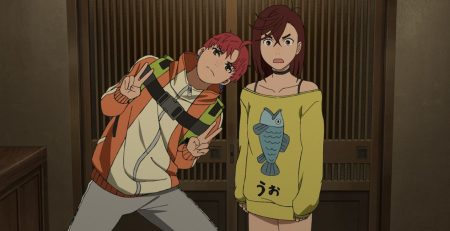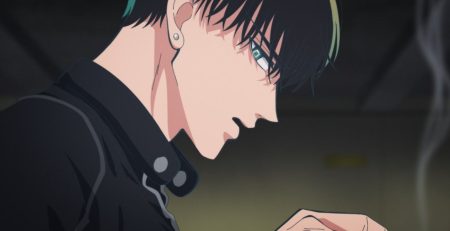
Content Warning: Platinum End deals with themes of suicide and bullying and contains a scene of sexual assault against a minor.
Platinum End is a dark fantasy anime produced by Signal.MD. Tired of the struggles and hopelessness of life, Mirai chooses to throw himself off a building. But instead of the sudden end to his existence that he expects, he finds himself landing safely due to the intervention of the angel Nasse. She informs Mirai that she has chosen him as a candidate to become the next God. All he has to do is win a competition, which will pit him against the other nine candidates, and he will be the new God. But does Mirai wish to be God? And if he does, what will Mirai have to be willing to do to achieve this goal?
Platinum End seeks to take the typically action-fueled battle royale genre of anime and imbue it with a deep, philosophical core. While the series does deliver some high tense action sequences, many of its most memorable moments are away from the action when the characters debate life, death, and the existence of the divine. Unfortunately, while many of these intellectual moments are crafted wonderfully, a few bring some of the series’ most challenging parts to get through.
It is revealed early in the show that all of the God Candidates share a single common trait. Each was on the verge of taking their own life when their angel intervened and made them a candidate. This setup provides fertile ground for the philosophical journey Platinum End sets out on. As each character’s backstory and motives are revealed to the audience, it is made abundantly clear that each of the characters’ reasons for finding themselves where they are couldn’t be more different. These differences in their past lead to very different views of the competition, what they will do if they become God, and what they are willing to do to win. While the series initially delivers these thoroughly nuanced viewpoints quite well, it tends to regurgitate the same discussions repeatedly. This is particularly true of Mirai and his aversion to killing people.
Mirai’s guiding principle throughout Platinum End‘s 24 episode run is to both be happy and see as many other people as happy as possible. This quickly proves problematic as the early episodes of the series introduce one of the most ruthless, heartless, and brutal anime villains I’ve ever seen: Metropoliman. After a genuinely horrifying display where the villain cruelly executes several of his opponents, it becomes clear that Mirai’s focus on love and peace will not survive Metropoliman’s brutal tactics.
Mirai’s struggles with this situation occupy far too much of the first half of this series. As the show revisits the issue again and again with no new developments, it gets extremely old far too quickly. Happily, the show does eventually come to a resolution on the matter, and it manages to move on.
Aside from Mirai, Platinum End‘s next most focal character is his childhood friend Sakai. While Sakai’s meek shyness makes the girl an instantly sympathetic character, the series manages to elevate her into something far more than that one note. Most impressively, though, it manages to expand upon the character while never wholly forsaking this core component. Allowing her to grow into something stronger while still managing to be the kind-hearted character she begins as.
With so much of Platinum End‘s story rotating around themes like the nature of life, death, and suicide, how the show treats these concepts is crucial. These are serious topics, and mishandling them can be extremely harmful to viewers with close, personal knowledge of some of the series’ darker concepts. While this is ultimately a judgment each must make for themselves, as someone who has battled depression and suicide for over 20 years, I felt that the show approaches these topics with the utmost care and respect.
I most appreciated how Platinum End handles these moments in the variety and depth they give to their cast and the circumstances that brought them to where they are. No two stories are the same. It isn’t just an endless series of “Oh, I was shunned and picked on, so I felt there was no point.” Instead, the series makes a focused effort to showcase that there are many reasons and circumstances that can push someone to these decisions.
The only time Platinum End fails to avoid cruelty and pain for shock value comes in a tragic scene involving a kidnapped girl and her soon-to-be killer. The show portrays the killer doing some perverse things toward the girl before taking her to her end. This sequence is the one time that the series goes too far for me in its exploration of pain and death. It serves no purpose but to blemish the respectful nature of the rest of the narrative.
When the debating ends and the fights start, Platinum End delivers some of the most tension-filled sequences I’ve experienced in a long time. With the God Candidates gifted special abilities for the competition, we see some over-the-top moments of action framed within some brilliant tactical thinking on the part of the show’s cunning characters.
All of these elements are brought together through the show’s unique designs and strong visual presentation. Both the combat and the philosophy of the series are presented with a wonderful flair for dramatic camera angling. The show always makes the viewer feel like they are amid the characters as they struggle with the obstacles before them.
All of this leads up to the aspect of Platinum End that I feel many will find divisive. That is the ending. While I won’t spoil it, I think some will think the conclusion is a brilliant capper that fits the tone and nature of the series perfectly, while others will simply exclaim, “That’s it!!??”.
When all is said and done, I’m thankful I found the time to watch Platinum End. While it has its rough patches along the way, I feel its nuanced look at the nature of suicide, tense action sequences, and strong cast made me ultimately think fondly of my time with Mirai, Sakai, and the rest.
Platinum End is streaming on Crunchyroll.
Platinum End Season 1
-
Rating - 7.5/107.5/10
TL;DR
I’m thankful I found the time to watch Platinum End. While it has its rough patches along the way, I feel its nuanced look at the nature of suicide, tense action sequences, and strong cast made me ultimately think fondly of my time with Mirai, Sakai, and the rest.




